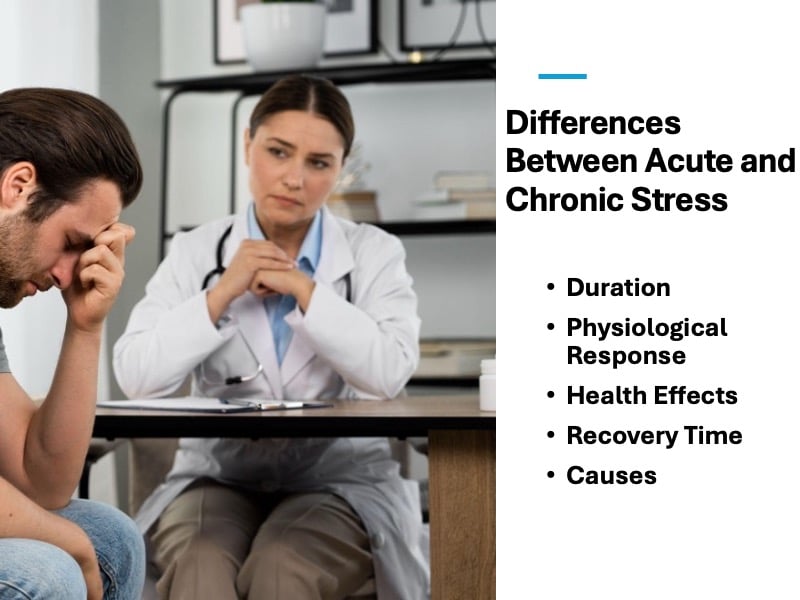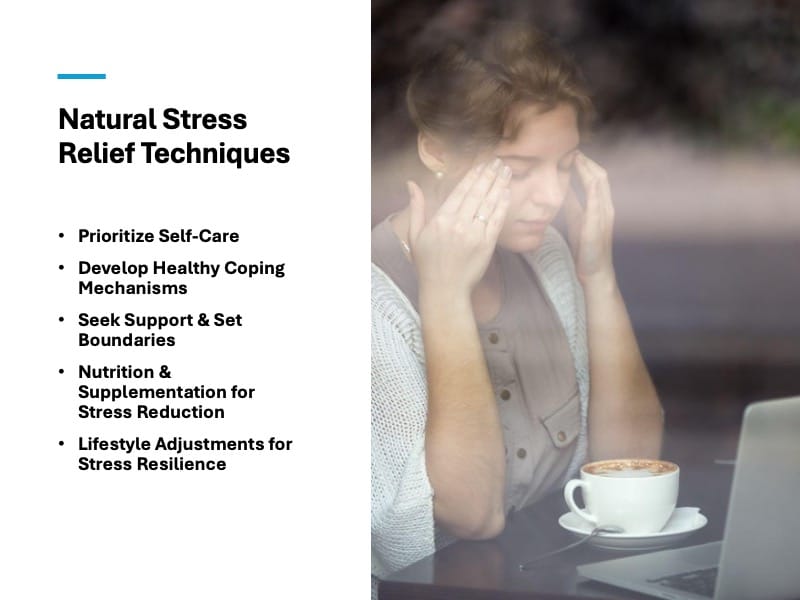Acute vs. Chronic Stress: Key Differences and Health Effects
Stress is an unavoidable part of life, but not all stress is the same.
Some stress can be short-lived and even beneficial, while others linger and take a toll on overall well-being.
Whether it’s meeting a deadline, facing a personal crisis, or dealing with long-term financial troubles, stress can affect individuals differently.
The distinction between acute and chronic stress is crucial in understanding how the body reacts and how to manage it effectively.
Many people underestimate the long-term consequences of stress, often ignoring symptoms until it affects their physical or mental health.
Recognizing the differences between acute and chronic stress can help in developing strategies to mitigate its negative effects.
The Difference Between Acute and Chronic Stress

Understanding whether one is dealing with acute or chronic stress is essential in choosing the right coping strategies.
Acute stress is typically situational, short-lived, and resolves once the stressor is removed.
Chronic stress, on the other hand, persists over weeks, months, or even years, becoming a constant burden.
If stress symptoms appear suddenly and fade after a short period, it’s likely acute stress.
However, if feelings of anxiety, fatigue, or tension persist for an extended period, it may be a sign of chronic stress that requires intervention.
What is Acute Stress?
Acute stress is a short-term response to an immediate challenge or threat. It is the body’s way of preparing to deal with unexpected situations, often referred to as the “fight-or-flight” response.
This type of stress is triggered by sudden events such as an argument, a near-miss accident, or an important presentation.
While acute stress can be intense, it usually subsides quickly once the situation is resolved.
Effects of Acute Stress on the Body
Acute stress initiates a cascade of physiological responses driven by the sympathetic nervous system.
The hypothalamic-pituitary-adrenal (HPA) axis rapidly signals the adrenal glands to release adrenaline and cortisol, increasing heart rate (tachycardia), blood pressure (vasoconstriction), and respiratory rate to enhance oxygen delivery to muscles and the brain.
This prepares the body for a “fight-or-flight” response by mobilizing glucose for energy and sharpening mental focus.
While these reactions are essential for short-term survival, frequent acute stress can lead to excessive muscle tension due to prolonged neuromuscular activation, resulting in headaches and musculoskeletal discomfort.
Additionally, cortisol’s impact on the gastrointestinal tract can slow digestion, contributing to acid reflux, nausea, or stomach cramping.
Heightened autonomic activity may also disrupt the sleep-wake cycle, impair immune function, and trigger short-term anxiety by overstimulating the amygdala, the brain’s fear-processing center.
If acute stress episodes become recurrent, they may increase susceptibility to chronic stress-related conditions.
How to Manage Acute Stress
Effectively managing acute stress requires activating the parasympathetic nervous system to counteract the body’s heightened fight-or-flight response.
Quick relaxation techniques for acute stress include:
- Diaphragmatic breathing stimulates the vagus nerve to lower heart rate and blood pressure.
- Progressive muscle relaxation can rapidly reduce tension.
- Mindfulness meditation and guided visualization help redirect focus away from stressors, promoting a sense of calm.
- Physical activity, such as a short walk or stretching, can help dissipate excess adrenaline and cortisol, restoring homeostasis.
- Engaging in cognitive reframing—actively shifting negative thoughts into positive or neutral perspectives—can improve emotional resilience.
Along with these natural remedies for stress relief, taking strategic breaks throughout the day, even for a few minutes, allows the nervous system to reset, preventing the accumulation of stress.
Consistently practicing these techniques enhances the body’s ability to regulate acute stress responses more efficiently over time.
What is Chronic Stress?
Chronic stress is a prolonged, persistent state of physiological and psychological strain that occurs when individuals face ongoing pressure without adequate relief.
Unlike acute stress, which is short-lived and resolves once the stressor is removed, chronic stress lingers for weeks, months, or even years.
Common causes include financial instability, workplace conflicts, strained relationships, and long-term health concerns.
Beyond external stressors, chronic stress can also be exacerbated by dietary choices.
Consuming a diet high in ultraprocessed foods, refined sugars, and unhealthy fats can contribute to chronic inflammation, which places continuous stress on the body’s systems.
Excessive sugar intake, for example, leads to frequent spikes in blood glucose and insulin, promoting oxidative stress and dysregulating the hypothalamic-pituitary-adrenal (HPA) axis, further intensifying stress responses.
Additionally, gut microbiome imbalances from poor dietary choices can impair neurotransmitter production, increasing susceptibility to anxiety and depression.
If left unaddressed, chronic stress disrupts homeostasis and can contribute to serious health conditions, including cardiovascular disease, metabolic disorders, weakened immunity, and mental health issues such as anxiety and depression.
Recognizing and mitigating chronic stress early is essential for long-term well-being.
Signs of Chronic Stress
People experiencing chronic stress may notice persistent fatigue, difficulty concentrating, irritability, sleep disturbances, and frequent illnesses.
Unlike acute stress, where symptoms resolve quickly, chronic stress symptoms persist and gradually worsen over time.
Long-term Effects of Chronic Stress on the Body
Prolonged exposure to elevated stress hormones, particularly cortisol and adrenaline, can profoundly disrupt both physical and mental well-being.
Chronic stress keeps the hypothalamic-pituitary-adrenal (HPA) axis in overdrive, leading to persistent inflammation, metabolic imbalances, and impaired immune function.
Physically, chronic stress is a major risk factor for hypertension, as sustained vasoconstriction increases blood pressure and strains the cardiovascular system. Elevated cortisol promotes visceral fat accumulation, increasing the likelihood of obesity, insulin resistance, and type 2 diabetes.
Additionally, chronic stress weakens immune defenses, making individuals more susceptible to infections and inflammatory diseases.
Mentally, chronic stress can rewire neural pathways, increasing the risk of anxiety disorders, depression, and emotional burnout.
Prolonged cortisol exposure reduces hippocampal volume, impairing memory and cognitive function while overstimulating the amygdala, heightening fear and stress responses.
Stress doesn’t only manifest physically; it also has profound psychological consequences.
Chronic stress can lead to emotional exhaustion, reduced motivation, and an increased likelihood of developing mental health conditions.
People struggling with chronic stress often find it difficult to enjoy everyday activities, maintain relationships, and stay productive at work.
If ignored, chronic stress can lead to serious burnout, requiring extended recovery time.
Natural Stress Relief Techniques

Chronic stress can significantly impact both mental and physical health. However, adopting proactive strategies can mitigate its effects and enhance resilience.
Below are the most effective, research-backed methods for managing acute and chronic stress.
Prioritize Self-Care
- Exercise regularly: Strength training, cardio workouts, and yoga lower cortisol, improve mood, and enhance stress resilience.
- Get quality sleep: Poor sleep exacerbates stress; aim for 7–9 hours per night.
- Maintain a nutrient-dense diet: Eating a nutrient-dense, well-balanced diet that contains whole foods, omega-3s, and magnesium-rich foods supports brain and nervous system function.
- Practice relaxation techniques: Mobility workouts, meditation, and deep breathing activate the parasympathetic nervous system to promote calmness.
Develop Healthy Coping Mechanisms
- Engage in mindfulness practices: Meditation, gratitude journaling, and cognitive reframing help process stress constructively.
- Spend time in nature: Outdoor activities lower cortisol and boost mood.
- Listen to calming music: Slow-tempo instrumental music reduces heart rate and blood pressure.
- Use progressive muscle relaxation: Helps relieve tension from stress-induced muscle tightness.
Seek Support & Set Boundaries
- Talk to trusted individuals: Support from friends, family, or mental health professionals reduces emotional stress.
- Set clear boundaries: Overcommitment contributes to stress—learn to say no and delegate tasks.
- Manage time effectively: Prioritize tasks and take short breaks to prevent burnout.
Nutrition & Supplementation for Stress Reduction
- Limit refined sugar & caffeine: These trigger blood sugar instability and cortisol spikes.
- Incorporate adaptogens: Ashwagandha, holy basil, and rhodiola help balance the body’s stress response.
- Consume stress-relief teas: Chamomile, lemon balm, and lavender teas promote relaxation.
- Ensure adequate magnesium & B vitamins: Both magnesium and the B-vitamins support nervous system function and reduce fatigue.
Lifestyle Adjustments for Stress Resilience
- Take short naps (20–30 minutes): Taking naps enhances cognitive function and stress recovery.
- Use a weighted blanket: Weighted blankets mimics deep pressure stimulation, promoting relaxation and better sleep.
- Get regular massages or do self-massage therapy: Massages and self-massage therapy stimulate pressure receptors, reducing tension and anxiety.
When to Seek Professional Help for Stress Relief

While some stress is manageable with lifestyle changes, severe or persistent stress may require professional intervention.
If stress begins to interfere with daily life, work, or relationships, seeking help from a therapist, counselor, or healthcare provider is advisable.
Persistent stress can lead to serious health conditions if left untreated, so early intervention is key.
If stress is affecting your ability to work, you may even require an online sick note to help you take the necessary time off.
Final Thoughts: Keys to Managing Acute and Chronic Stress
Stress is an inevitable part of life, but understanding the differences between acute and chronic stress can help individuals manage it more effectively.
Acute stress is temporary and manageable, whereas chronic stress can have long-term health consequences.
By adopting healthy coping mechanisms, seeking support, and recognizing when professional help is needed, individuals can take control of their stress levels and lead healthier, more balanced lives.
Whether it’s taking a break, practicing relaxation techniques, or making lifestyle changes, proactive stress management is essential for long-term well-being.
Addressing stress early can prevent it from escalating into serious health problems, ensuring a more fulfilling and stress-free life.
This website does not provide medical advice. This website site does contain affiliate links, and purchases may earn a commission.
Read my Medical Disclaimer, Review Disclaimer, and Publishing Policies for more details. Use of this site indicates acceptance of these terms.



